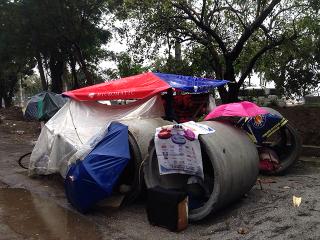
Roxas Blvd. denizens find shelter in concrete pipes. Homeless denizens of Roxas Boulevard take shelter from Ruby’s rain in concrete drainage pipes on Tuesday, December 9. Roxas Boulevard had been declared a “no man’s land” by Manila city officials as the storm approached. Howie Severino
DOLORES, Eastern Samar – Typhoon Ruby (Hagupit) weakened further on Tuesday as the storm crawled across the central Philippines, while rescue workers struggled in its aftermath to reach towns in central provinces where thousands of homes were wrecked and at least 27 people killed.
Nearly 13,000 houses were crushed and more than 22,300 were partially damaged in Eastern Samar province, where Ruby first hit land as a category 3 typhoon on Saturday, local officials said.
“Access is very difficult, roads are spotty. There are landslides, some are one-lane roads. In the inner barangays (villages), many of them are washed out by flash floods,” Richard Gordon, chairman of the Philippine Red Cross, told Reuters.
The typhoon weakened to a tropical depression on Tuesday with maximum winds of 60 kph (37 mph) near its center, as it made a fifth landfall over the Lubang islands, 150 km (93 miles) southwest of capital Manila. It is now moving west towards the South China Sea at 13 kph (8 mph).
More than 2 million people so far have felt the impact of Ruby, with nearly 1.7 million fleeing to relatives’ homes on safer ground or packing in to evacuation centers across the central Philippines and south of the main Luzon island, the national disaster agency said.
The 27 people reported killed died in Iloilo province and on Samar island, including 12 residents in Borongan town in Eastern Samar who were swept away by raging waters and flash floods, the Red Cross’s Gordon said, citing initial reports from his field staff.
“A detailed assessment is now ongoing…It’s a long trek (to the villages), it’s like Yolanda all over again,” Gordon said, referring to the local name of super typhoon Haiyan, which last year killed thousands of people in the same areas of central Philippines.
The death toll monitored by the Red Cross is way above the official count of the national disaster agency which counted three dead so far.
Bank employee Arnalyn Bula told Reuters how howling winds had pounded the walls of her aunt’s two-storey concrete home in Dolores town in Eastern Samar, where her family sought shelter.
“Our kitchen was wrecked. Around us, our neighbors’ homes were flattened like folded paper,” said Bula, 27.
The privately run National Grid Corp, which operates the country’s main transmission lines, said nearly 2 million homes across central Philippines and southern Luzon remain without power.
Despite the toll and damage, there is relief that Ruby has not brought destruction on the scale of Yolanda, which totally or partially damaged more than one million houses in the same areas of the central Philippines.
![]()